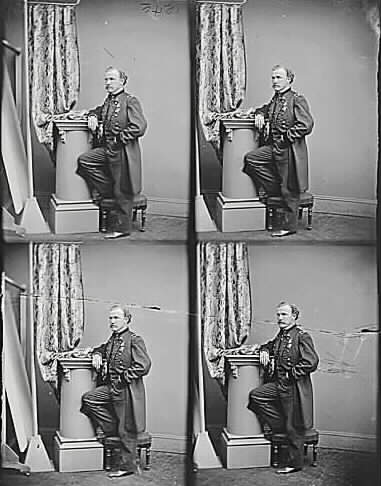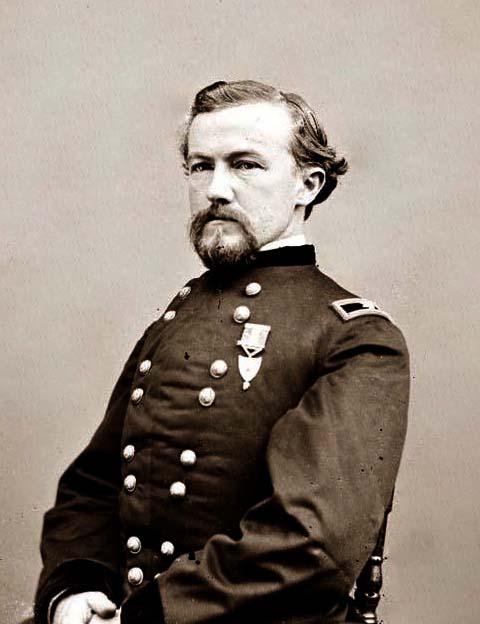Charles Ewing was the youngest of three brothers who became Union Generals and brother-in-law of William T. Sherman, was born March 6, 1835, in Lancaster, Ohio, the son of Thomas Ewing, Senator from Ohio, Secretary of the Treasury, and Secretary of the Interior. His education was obtained at local schools, at a Dominican college, and at the University of Virginia.
He studied law and was practicing in St Louis at the outbreak of the Civil War. On May 14, 1861, he received a commission as Captain of the newly authorized 13th US Infantry. This regiment was stationed at Alton, Illinois, until ordered to Memphis in October 1862, during the furor occasioned by Braxton Bragg’s invasion of Kentucky.
At the siege of Vicksburg, Ewing’s regiment – or a battalion thereof – was a part of Francis P. Blair’s Division of Sherman’s XV Corps, and he won praise from Blair for his conduct during an assault on the Confederate works. Shortly afterward hw as appointed Assistant Inspector General with the rank of Lieutenant Colonel and assigned to Sherman’s staff. Although this may have been nepotism in this, he discharged his duties gallantly and was brevetted three times for services performed during the balance of war, as he accompanied Sherman in many campaigns.
After distinguished service at Chattanooga, in the Atlanta Campaign, on the famous “Mar to the Sea,” and in campaign of the Carolinas which resulted in surrender of the Confederacy’s second most important army under Joseph E. Johnston, he was brevetted a Colonel in the Regular Service to rank from March 13, 1865, five days after being comm a full-rank Brigadier General of United States Volunteers.
Although Sherman’s influence had something to do with all this, his record was unassailable. After brief service as Captain of the 22nd Infantry, to which he had transferred, he resigned in 1867, and began the practice of law in Washington, D.C. He died there June 20, 1883, and was buried with full military honors in Section 4 (Grave 5563) of Arlington National Cemetery.
Charles Ewing was born in Lancaster, Ohio, on 3 March 1835, the fifth son of Thomas and Martha (Boyle) Ewing.
Several members of his family gained prominence. His father was a United States Senator and a cabinet member, serving as Secretary of the Treasury under William Henry Harrison and John Tyler in 1841 and the first Secretary of the Interior under Zachary Taylor (1849-1850). His brothers Hugh and Thomas were a writer and a Member of Congress, respectively, and his sister Ellen married their foster brother, William Tecumseh Sherman. Whereas Thomas Sr. did not belong to any church until his last-minute conversion to Catholicism in 1871, the children were raised in the Catholic faith of their mother.
Charles was educated at St. Joseph’s, a Dominican college in Perry County, Ohio; Gonzaga College in Washington, DC; and the University of Virginia. He practiced law in St. Louis, Missouri, from 1860 until his entry into the U.S. Army as a Captain in the 13th Infantry of the regulars in May 1861.
He rose swiftly in rank as he served with distinction in Arkansas and Missouri, and he was wounded three times at the Siege of Vicksburg in 1863. He was acting inspector-general for the Atlanta Campaign of 1864, where he served under his brother-in-law, General Sherman, and was cited for gallantry and promoted to brigadier-general. He resigned from the army in July of 1867 and resumed his law practice. In December 1870 he married Virginia Larwell Miller, the daughter of John K. Miller, a U.S. Representative from Ohio in the 30th and 31st Congresses.
The Grant administration, which took office in 1869, sought to replace the system of Indian agents, both civilians and army officers, who were proving unsatisfactory, especially in controlling the outbreaks of Indian unrest. Grant’s “Indian Peace Policy” stipulated that the civil administration of each Indian agency was to be entrusted to the religious denomination that had an established mission among the tribe. These denominations would have the right to nominate agents, subject to the approval of the Secretary of the Interior, and call for their removal. Since much of the mission work among Native Americans was carried out by Roman Catholics, the church expected to receive at least 38 of the 72 agencies.
Unfortunately, the President’s original plan was amended so that various Protestant churches received the majority of the agencies, with only eight going to the Catholic Church. The frustrated American bishops, determined to do full justice to their allotted agencies and to struggle to gain control of additional ones, selected Ewing as the first Catholic Commissioner for Indian Missions, a position within the newly established Catholic Indian Bureau. As a Catholic lawyer based in the nation’s capital, it was thought he was best suited to protect Catholic interests against Protestant encroachments in dealing with the federal government over Native American affairs. Ewing had already acted on behalf of Catholic Indian missions in the past, and he soon secured the assistance of Rev. Joseph Brouilett, Vice-General of the Diocese of Nesqualy, Indian Territory.
In 1877, Pope Pius IX recognized Ewing’s efforts by creating him a knight of the Order of Saint Gregory the Great. Ewing continued in his capacity as Catholic Commissioner until his death in 1883 from a sudden attack of pneumonia.
Present is an incomplete and undated article on Ewing’s life until July 1861 that includes excerpts from family letters and his diary, which describes his education, the founding of his Missouri law firm, and his enlistment in the US Army in 1861; a copy of his 21 June 1883 obituary from the New York Times; and a pamphlet containing the discourse of Msgr. Peter Guilday on the occasion of Ewing’s reinterment in Arlington National Cemetery in 1935.

Michael Robert Patterson was born in Arlington and is the son of a former officer of the US Army. So it was no wonder that sooner or later his interests drew him to American history and especially to American military history. Many of his articles can be found on renowned portals like the New York Times, Washingtonpost or Wikipedia.
Reviewed by: Michael Howard

